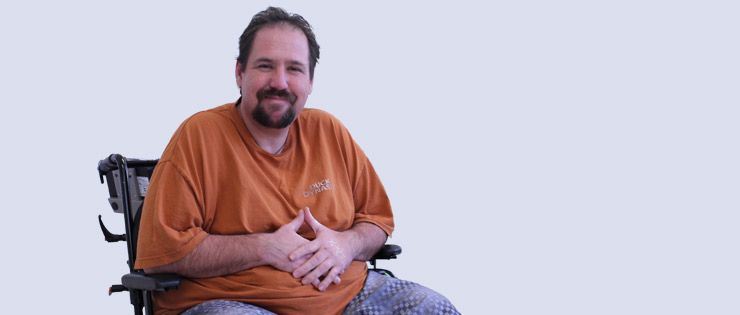Newsroom
Out-of-this-world research could help rehabilitation patients in Ottawa
mai 13, 2016
 Entrepreneur Raymond Nicholas spent three months in a hospital bed and another three learning how to walk again. His doctor Dr. Guy Trudel is studying astronauts’ health in space, which he hopes will lead to faster rehabilitation for patients like Nicholas.
Entrepreneur Raymond Nicholas spent three months in a hospital bed and another three learning how to walk again. His doctor Dr. Guy Trudel is studying astronauts’ health in space, which he hopes will lead to faster rehabilitation for patients like Nicholas.
After an infection from a blocked bowel left him fighting for his life, 36-year old Raymond Nicholas spent three months in an ICU bed, muscles throughout his body weakening to the point where he could barely feed himself. For an active father used to playing football and working 10-hour days installing alarms and home communication systems, learning how to catch a ball and walk again was a challenge.
“Emotionally, it’s very hard. It’s hard to see my daughter look at me a bit differently,” said Nicholas. “We always did a lot of outdoors stuff together, fishing, hunting, walks with the dogs. My main goal is to coach my daughter’s ball team again.”
Nicholas was surprised to learn that his long time in bed means he now has something in common with astronauts—their muscles and bones often weaken after long flights because of the lack of forces acting on them in space.
Nicholas’ physiatrist, a doctor who specializes in physical medicine and rehabilitation, Dr. Guy Trudel, is the principal investigator studying 10 astronauts over the course of their six-month missions as well as the year after they return. He hopes to better understand how living in space affects their bone marrow health and how it recovers after returning to Earth.
Funded by the Canadian Space Agency, Dr. Trudel’s study would not only help astronauts prepare for longer missions in space, but could also be applied to patients on Earth who are bedridden for long periods like Nicholas.
“With basic research, it takes a long time to see the results of your efforts. On the other hand, caring for patients as a physician provides immediate results,” said Dr. Guy Trudel, physiatrist at The Ottawa Hospital Rehabilitation Centre and a Professor at the University of Ottawa. “It is a privilege to combine both the medical practice and scientific investigation in every normal work week.”
Once Nicholas became independent with his mobility at the Rehabilitation Centre, he returned home to his daughter and family. Dr. Trudel expects him to continue his recovery in the coming months. In the meantime, Nicholas will be following Dr. Trudel’s astronaut research with interest.
“I never knew they came back in the same condition as me,” said Nicholas. “It gives you something to look up to.”
For more information about Dr. Trudel’s MARROW project, see the Canadian Space Agency’s video, the University of Ottawa's Tabaret, and NASA’s video and article.
The Ottawa Hospital: Inspired by research. Driven by compassion
The Ottawa Hospital is one of Canada’s largest learning and research hospitals with over 1,100 beds, approximately 12,000 staff and an annual budget of over $1.2 billion. Our focus on research and learning helps us develop new and innovative ways to treat patients and improve care. As a multi-campus hospital, affiliated with the University of Ottawa, we deliver specialized care to the Eastern Ontario region, but our techniques and research discoveries are adopted around the world. We engage the community at all levels to support our vision for better patient care.
University of Ottawa
The University of Ottawa is home to over 50,000 students, faculty and staff, who live, work and study in both French and English. Our campus is a crossroads of cultures and ideas, where bold minds come together to inspire game-changing ideas. We are one of Canada’s top 10 research universities—our professors and researchers explore new approaches to today’s challenges. One of a handful of Canadian universities ranked among the top 200 in the world, we attract exceptional thinkers and welcome diverse perspectives from across the globe. www.uottawa.ca
For further information, please contact
Amelia Buchanan
Senior Communication Specialist
Ottawa Hospital Research Institute
Office: 613-798-5555 x 73687
Cell: 613-297-8315
ambuchanan@ohri.ca
